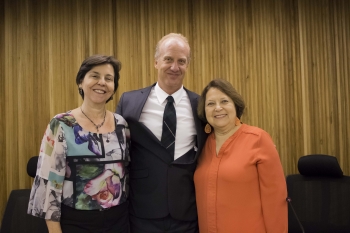FGV’s Center for Social Policy (FGV Social/CPS) held on November 27, a debate connecting the past, present and future of public policies. The seminar "Fighting poverty, inclusive growth and the new social agenda", led by the director of FGV Social/CPS, the economist Marcelo Neri, was attended by Tereza Campello, Minister of Social Development of the current Brazilian government, and Wanda Engel, Minister of Social Welfare in the government of Fernando Henrique Cardoso. The connection between the history of the development of federal policies aimed at the poorest populations and their results were the highlight of the event. Created 15 years ago, the CPS made several contributions in the making of a new generation of income policies, implemented during this period.
"Since 2001, extreme poverty in Brazil dropped 70.1%, due to a combination of growth and equality among Brazilians. Each explains half of this poverty reduction. The result of this kind of middle way between the economic and social spheres is the recipe behind the results achieved", said Marcelo Neri.
The income of the poorest 5% of the Brazilian population increased 216% in real terms since 2001. Actions in the educational system and the adoption of conditional income programs each explain one third of the income growth among the poor. "It is necessary to learn the lessons of the convergence strengths of the initiatives among different programs at any given time and also over time", he said.
"Technically, we achieved the new global goal of overcoming poverty planned for 2030. The UN's original goal was to reduce extreme poverty by half until 2015. We managed to go beyond, both in the results and our proposals to overcome poverty. The Brazilian strategy was recently adopted in the Sustainable Development Goals (SDGs). Overcoming income based poverty is just the beginning. In 2000, during the launch of the program Bolsa Escola Federal, the HDI for 41% of municipalities was too low, droping to 0.6% in 2010. This is what you might call a deep transformation", added Neri.
The Minister of Social Development, Tereza Campello, presented a drop in multidimensional poverty indicators based on indicators stronger than income based ones. She talked about the impact that a budget cut would have on the beneficiaries of the Bolsa Família program. However, the minister does not believe in a reversion of the program, despite the fiscal crisis the country is facing.
In this respect, Marcelo Neri, who has already been President of the Institute of Applied Economic Research (IPEA) and Minister of the Office for Strategic Affairs of the Presidency (SAE/PR), added that "we currently have new challenges; we have to improve our policies and make prospective choices to make the most of every real spent by governments. In fact, Bolsa Escola and Bolsa Alimentação, precursors of Bolsa Família, were created and initiated after the 1999 crisis in Brazil. We have to use the current crisis to advance with more quality towards common goals", he said.
According to the dean, Bolsa Família is where every invested real has more impact. It is difficult to point out one policy with such a social/fiscal effectiveness. Campello and Neri edited a book on the program and created a social technology export platform to other countries.
The former Minister of Social Welfare for the government of Fernando Henrique Cardoso, Wanda Engel, stressed that the need to adopt social policies in Brazil became clear with the 1988 Constitution, and that, from 1999, milestones of the policy to fight poverty, which represent new guidelines, were created. According to her, ensuring students will complete at least their high school studies is a way of ensuring young people will emerge from poverty. For the former minister, it is essential to establish partnerships: "We need to encourage partnerships among government, the business community, the media and religious segments. The culture of partnership is incipient. We do not know how to handle differences", she regretted. Wanda also praised the work of the Ministry of Social Development ahead of the Bolsa Família program.
In its 15 years of operation, the CPS participated in the design of federal income policies in different periods, starting with the adoption of a state level minimum wages in 2001, as well as the implementation of conditional cash transfer programs at all the three levels of government, including a number of adjustments in the federal programs during different administrations and the creation of local programs such as "Família Carioca" in the city of Rio de Janeiro, and "Renda Melhor" in the state of Rio.
Please check the full seminar here.The materials that were mentioned are available on the web site.





